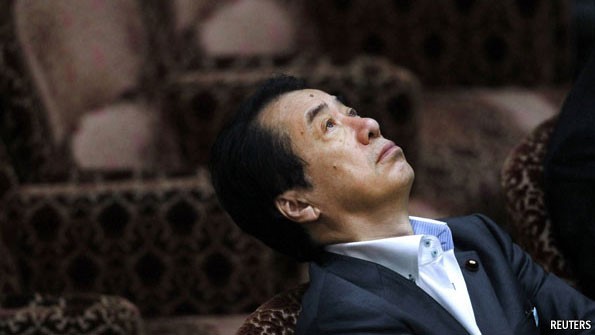

 字體:小 中 大
字體:小 中 大 |
|
|
|
| 2018/03/04 18:54:37瀏覽41|回應0|推薦0 | |
Japans prime minister One step ahead of the executioner The unfathomable Naoto Kan defies both friends and enemies Jun 30th 2011 | TOKYO | from the print edition
LIKE one of the irradiated dogs that have been left to fend for themselves in the shadow of the Fukushima Dai-ichi nuclear power plant, Naoto Kan, the Japanese prime minister, is giving the impression that he has gone feral. Why else but because of a blind craving for power would he defy even his friends within the government who are begging him to resign? Given that politics has been in a state of paralysis since the earthquake, tsunami and nuclear accident on March 11th, it is a fair question. Both outside the ruling Democratic Party of Japan (DPJ) and within it, many politicians are so exasperated with Mr Kan’s lack of leadership that they cannot see any hope of laws essential for recovery and reconstruction being passed until he steps down. Yet, either through luck or cunning, Mr Kan has managed to keep one step ahead of those baying for his blood. He survived a no-confidence motion in parliament a month ago by promising to step down eventually. On June 27th Mr Kan at last set the conditions that he said would enable him to resign. Related topics The conditions were the passage of three bills: a ¥2 trillion ($25 billion) supplementary budget to cope with the disaster; the issuance of bonds to finance the 2011-12 budget deficit; and an electricity initiative to broaden the scope of feed-in tariffs to encourage more use of renewable energy in the national grid. All three have been held up by opposition from the Liberal Democratic Party (LDP), which pretty much ran Japan for 55 years until 2009 and is fixated with destroying Mr Kan. It has demanded that he quits before, not after, it approves any bills—though Mr Kan would not be the only one to doubt its sincerity. Mr Kan’s conditions put the ball back in the LDP’s court, but not for long. Confusingly, on the same day that he set the conditions for his retirement, the prime minister reshuffled his cabinet. He appointed a renegade LDP politician, Kazuyuki Hamada, to handle internal affairs in parliament. With that move, Mr Kan managed to incense both the LDP and his own party. Given such confusion, some observers do not discount the possibility that Mr Kan might make one final lunge for redemption. They say that later this summer he might dissolve parliament and call a snap election, aiming to campaign on a pledge to abandon nuclear power. He might even quit, it is whispered, on the anniversary of the bombing on Hiroshima on August 6th, when anti-nuclear feelings run high. On June 28th Mr Kan did nothing to dispel the rumours, telling DPJ politicians that energy policy was likely to be the most important issue in the next election. There would be political resonances to such a gamble. In early August 2005 the then-prime minister, Junichiro Koizumi, called a snap election to push through postal privatisation. It was a move that nearly split the ruling LDP but also gave Mr Koizumi a landslide victory. In post-Fukushima Japan, nuclear power would be a much more emotive issue. “It could be a bomb to destroy both the DPJ and the LDP,” says Takeshi Sasaki of Gakushuin University in Tokyo. He speculates that, like Mr Koizumi, Mr Kan might attempt to surround himself with charismatic young politicians to be the face of the next government. Such people might include Goshi Hosono, Mr Kan’s 39-year-old Mr Fix-it who this week was appointed minister in charge of the nuclear mess. There are just as many reasons to doubt that such an election would be feasible, however. The high command of Mr Kan’s party would be staunchly opposed, fearing the DPJ would lose. Nor is it yet clear how firmly the public has swung against nuclear power since March 11th. After all, years of power shortages loom. What is more, no one in the disaster areas is in any mood for a national election. All they ask is for parliament to provide funds and lead the reconstruction. Mr Kan’s biggest drawback is that, unlike Mr Koizumi at the time, he is not popular. However much the public dislikes the mainstream parties, they do not like him either. A poll published on June 29th by Kyodo, a news wire, showed over two-thirds of those surveyed wanted him to step down immediately or by the end of August. The election scenario “won’t happen. It would be a suicide mission. He’s no Koizumi,” says Gerald Curtis of Columbia University. He certainly isn’t. But regardless of whether Mr Kan calls an election or not, if the main parties cannot find common ground for dealing with the disaster, they still need a bomb put under them. from the print edition | Asia ==== One step ahead of the executioner Jul 1st 2011, 08:16
Yeh, the article is not bad because you show ninja Naoto Kan’s embarrassment in contrast with a stubborn mule called Koizumi Junichiro. Very smart writing style can impress on many readers. Although Naoto Kan might hand his seat over to the other same party’s figure, DPJ may still hold power continuously. Rather than the last LDP ‘s then prime minister Taro Aso, it’s not unfortunate for Mr. Kan to step down by this way. At least, the funny LDP who is only seen as a mess cannot retake power in recent time.
Recommended 23 Report Permalink 日本前首相菅直人熬過了兩次票數險勝,包括在眾議院的不信任案和小澤一朗的總裁之爭確定了自己的政治地位,筆者以忍者稱之。其任上日本經濟規模在2011年第二季被中國超越,日本經濟體降為第三大。 筆者在這七年討論日本政治在頭幾年稍多,後來安倍晉三回任首相後偏重經濟面。日本方面的主題還有企業的經營方面。 |
|
| ( 心情隨筆|心情日記 ) |










